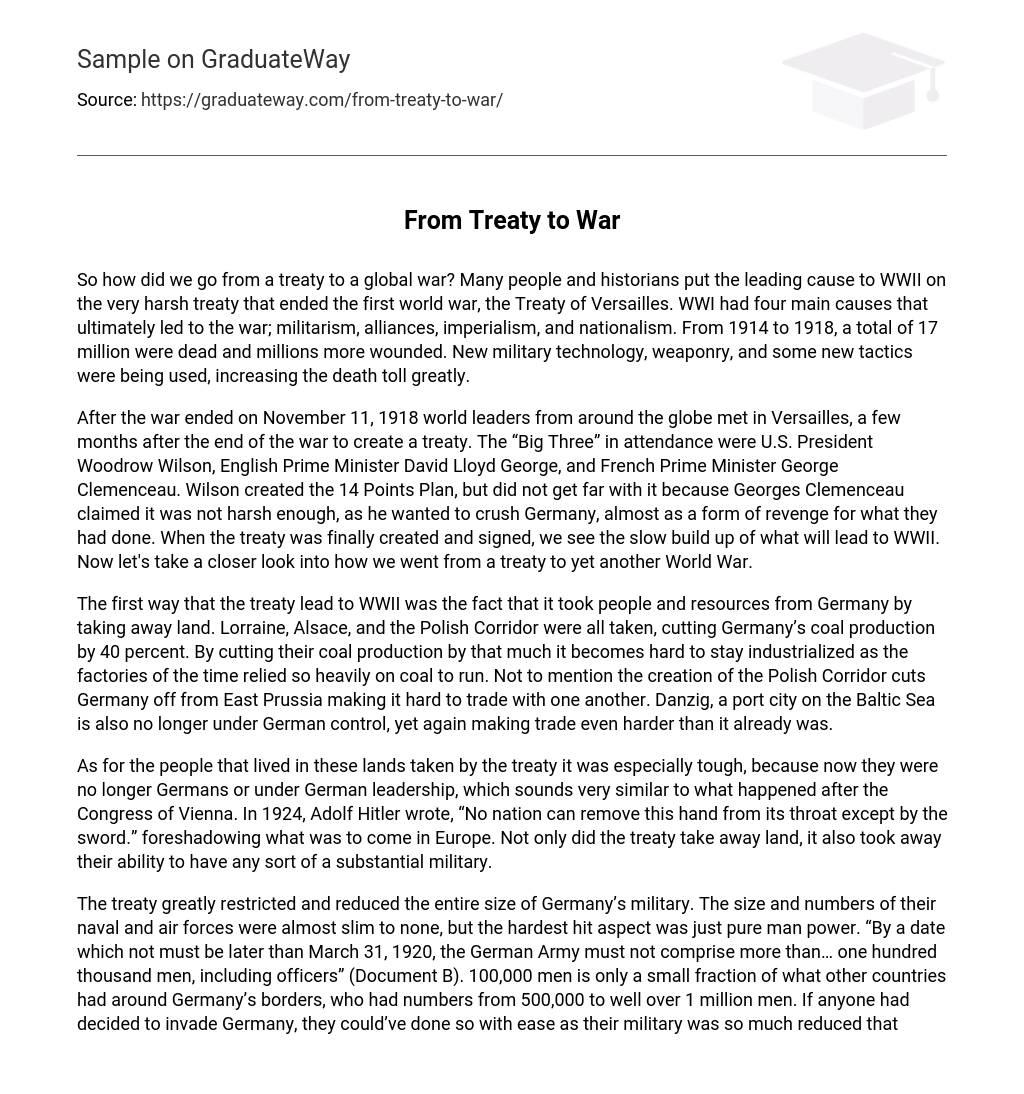So how did we go from a treaty to a global war? Many people and historians put the leading cause to WWII on the very harsh treaty that ended the first world war, the Treaty of Versailles. WWI had four main causes that ultimately led to the war; militarism, alliances, imperialism, and nationalism. From 1914 to 1918, a total of 17 million were dead and millions more wounded. New military technology, weaponry, and some new tactics were being used, increasing the death toll greatly.
After the war ended on November 11, 1918 world leaders from around the globe met in Versailles, a few months after the end of the war to create a treaty. The “Big Three” in attendance were U.S. President Woodrow Wilson, English Prime Minister David Lloyd George, and French Prime Minister George Clemenceau. Wilson created the 14 Points Plan, but did not get far with it because Georges Clemenceau claimed it was not harsh enough, as he wanted to crush Germany, almost as a form of revenge for what they had done. When the treaty was finally created and signed, we see the slow build up of what will lead to WWII. Now let’s take a closer look into how we went from a treaty to yet another World War.
The first way that the treaty lead to WWII was the fact that it took people and resources from Germany by taking away land. Lorraine, Alsace, and the Polish Corridor were all taken, cutting Germany’s coal production by 40 percent. By cutting their coal production by that much it becomes hard to stay industrialized as the factories of the time relied so heavily on coal to run. Not to mention the creation of the Polish Corridor cuts Germany off from East Prussia making it hard to trade with one another. Danzig, a port city on the Baltic Sea is also no longer under German control, yet again making trade even harder than it already was.
As for the people that lived in these lands taken by the treaty it was especially tough, because now they were no longer Germans or under German leadership, which sounds very similar to what happened after the Congress of Vienna. In 1924, Adolf Hitler wrote, “No nation can remove this hand from its throat except by the sword.” foreshadowing what was to come in Europe. Not only did the treaty take away land, it also took away their ability to have any sort of a substantial military.
The treaty greatly restricted and reduced the entire size of Germany’s military. The size and numbers of their naval and air forces were almost slim to none, but the hardest hit aspect was just pure man power. “By a date which not must be later than March 31, 1920, the German Army must not comprise more than… one hundred thousand men, including officers” (Document B). 100,000 men is only a small fraction of what other countries had around Germany’s borders, who had numbers from 500,000 to well over 1 million men. If anyone had decided to invade Germany, they could’ve done so with ease as their military was so much reduced that even protecting themselves would more than likely prove to be difficult. Germany was now smaller in terms of land size and military, what else could the treaty do to crush Germany?
Germany had lost the war and as a result had to take full responsibility for all damages and losses during the war. In order to do so, Germany was ordered to pay 132 billion gold marks in war reparations, which is over 367 billion in U.S. dollars. They were given 30 years to pay the debt off, but in fact it took almost a century for the country to repay the entire amount. Historian Laurence J. Moyer writes, “…most Germans saw it (The Treaty of Versailles) as an atrocious injustice, an evil thing which must be destroyed” (Document D). A deflated Germany would soon find something to rally around, however it would be Adolf Hitler and the Nazi Regime. Hitler would use the treaty to his advantage and continually break the restrictions it set on them, but no one would ever stop him in time.
While we will never know how different history could’ve been if the treaty was not so harsh on the Germans, it’s hard to ignore the facts that tells us the simple truth; the Treaty of Versailles largely led us to WWII. The harsh conditions set upon the country were clearly intended to crush Germany and prevent them from ever returning to a major world power. However, Adolf Hitler, a very strategic man, would use the treaty in their favor to soon return to their old form and attempt, ultimately, world domination.





